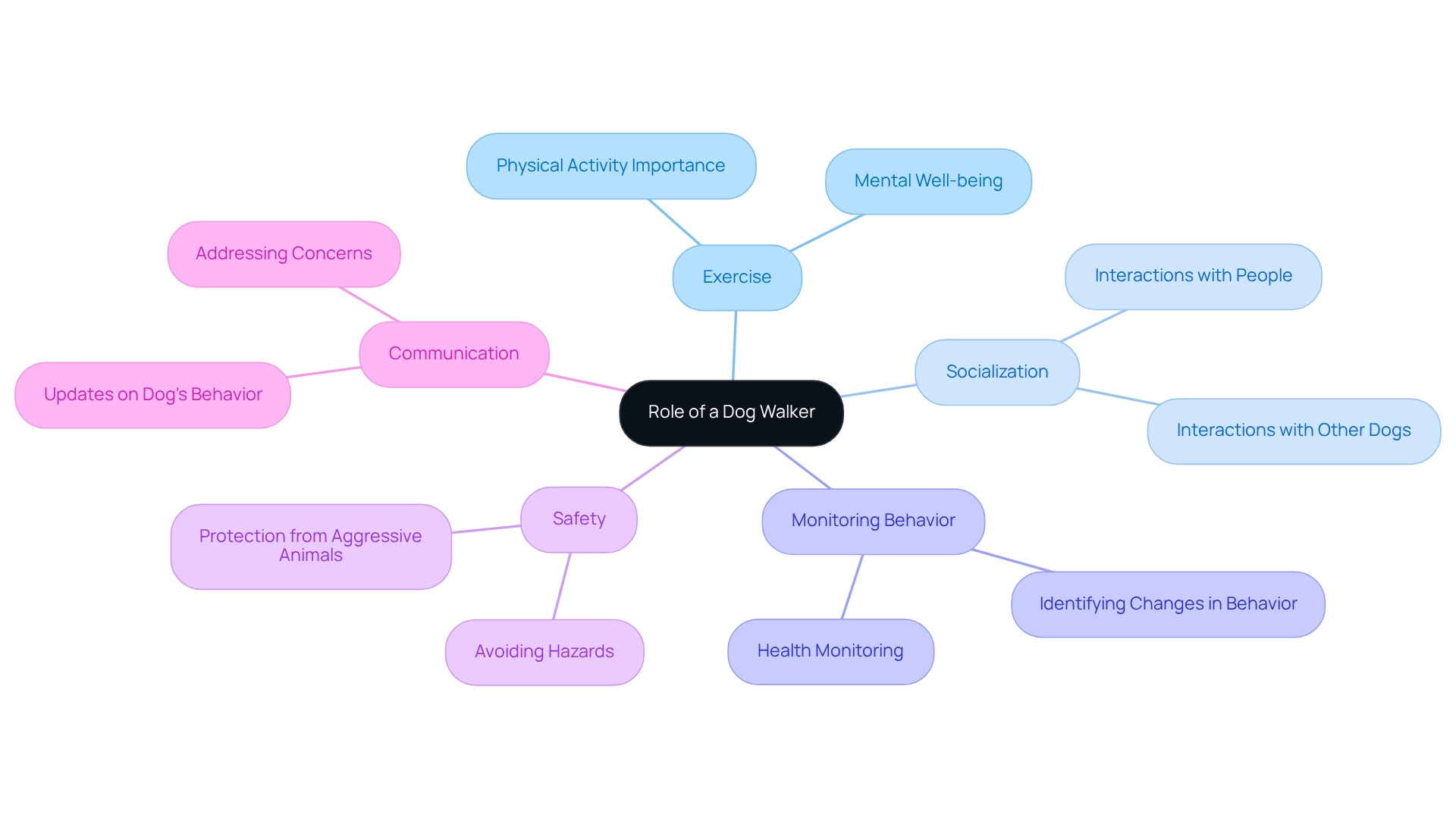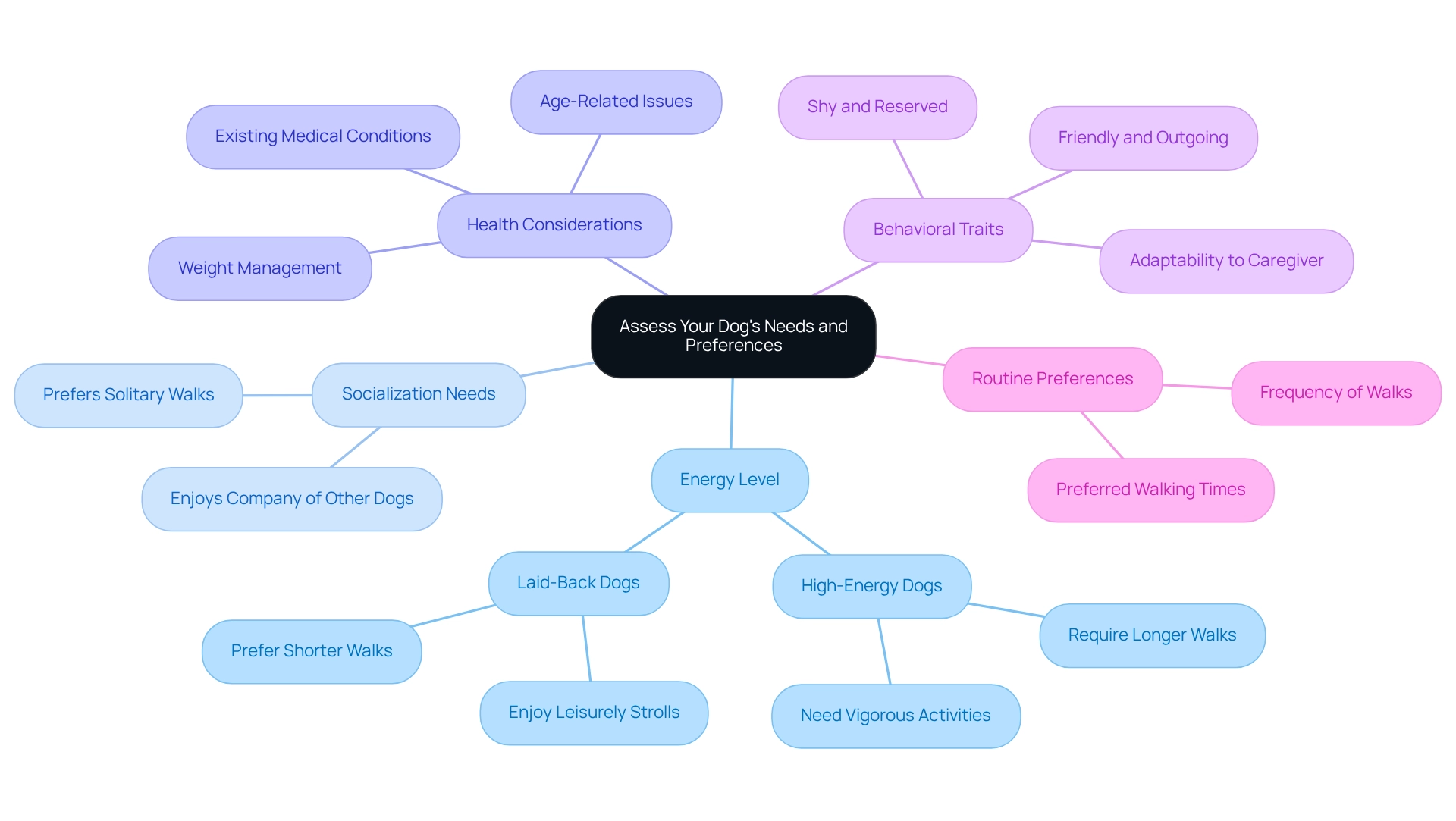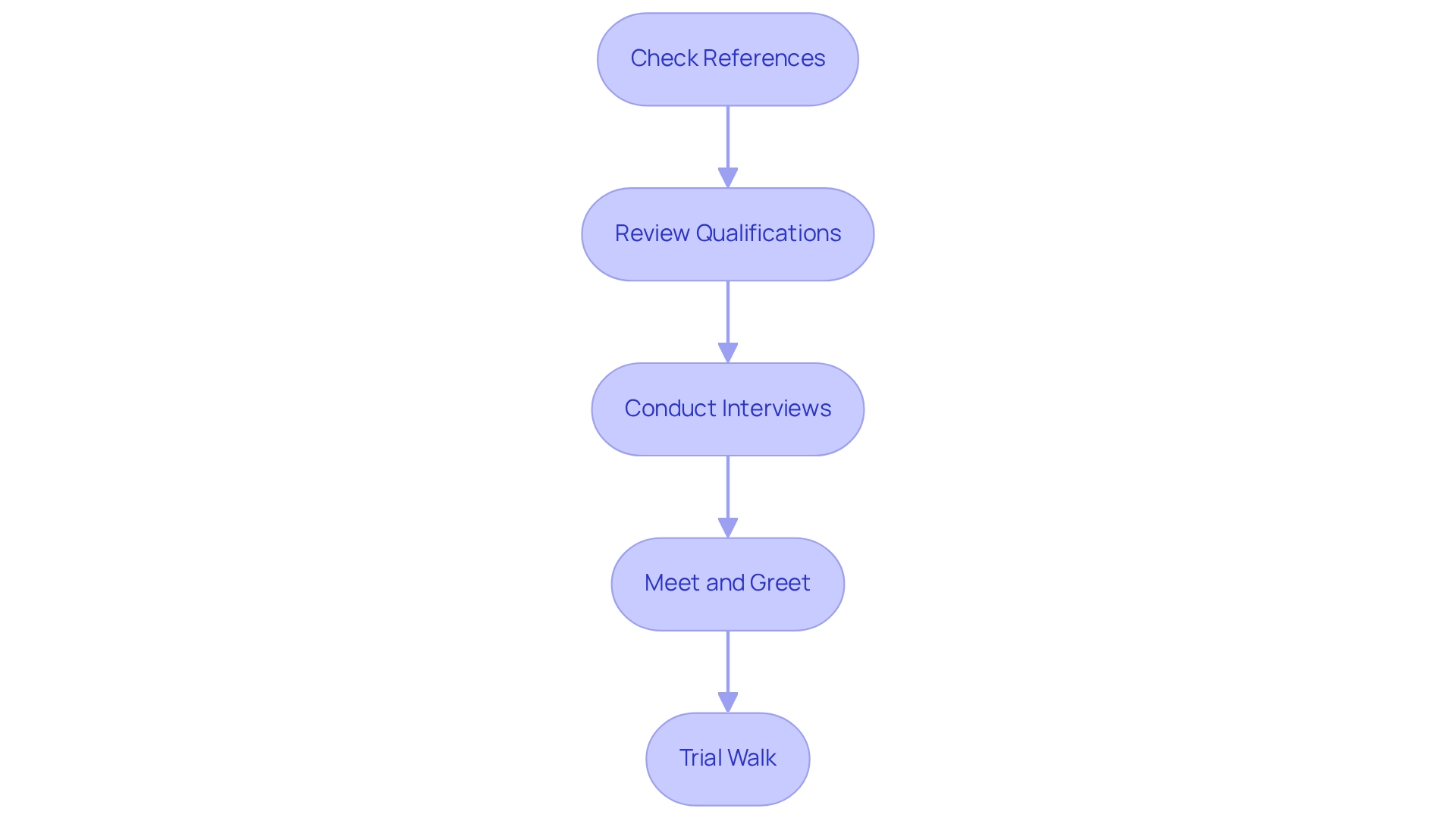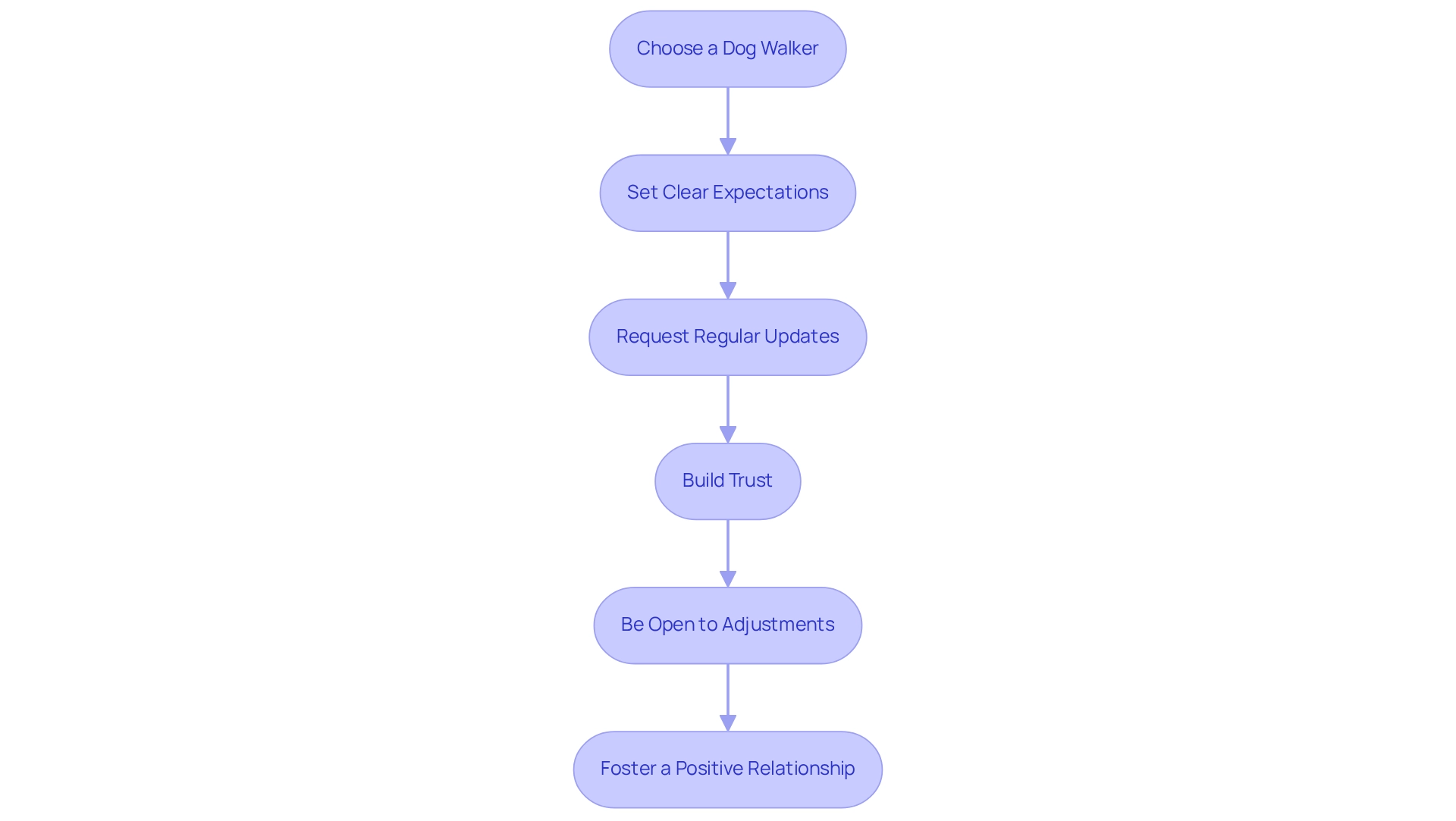
5 Steps to Choose the Right Dog Walker for Your Pet
Overview
Choosing the right dog walker for your beloved pet can feel overwhelming. It’s essential to consider your dog’s unique needs, from their energy levels to their socialization preferences. This process isn’t just about finding someone to take your dog for a walk; it’s about ensuring their happiness and well-being. Understanding your pet’s specific requirements can make all the difference in their daily experience.
As you explore various options for caregivers, remember that this decision impacts your furry friend’s life. It’s natural to feel anxious about who will be responsible for their care. By evaluating potential candidates through thoughtful interviews and trial walks, you can ease some of that worry. This isn’t just a job for the walker; it’s a commitment to nurturing your pet’s happiness.
Maintaining open communication with the chosen walker is vital. This relationship should be built on trust and understanding, ensuring that your pet receives the best possible care. When you find the right match, you can feel confident knowing that your dog is in good hands, allowing you to focus on what truly matters—the joy and contentment of your beloved companion.
Introduction
Finding the right dog walker can truly transform the experience for both pets and their devoted owners. It ensures that our furry friends receive the exercise, socialization, and care they need while we are away. As the demand for professional pet services continues to rise, it becomes increasingly important to understand the essential responsibilities of a dog walker.
This article explores the key factors to consider when choosing a dog walker:
- Assessing your dog’s individual needs and preferences
- Discovering various avenues for finding reliable candidates
By thoughtfully evaluating potential walkers and establishing a strong communication channel, pet owners can cultivate a harmonious relationship that benefits everyone involved, ensuring peace of mind and the well-being of their beloved pets.
Understand the Role of a Dog Walker
A dog walker plays a crucial role in ensuring that our beloved dogs receive the exercise and care they need while we are away. Understanding the responsibilities of a dog walker can help you appreciate the invaluable support they provide to your furry family members.
Walking the dog is not just about getting from point A to point B; it’s about ensuring your dog gets adequate exercise, which is essential for their physical and mental well-being. Imagine the joy on your dog’s face as they explore the world around them, feeling the grass beneath their paws and the sun on their fur. This experience is vital for their overall health and happiness, as socialization is another key aspect of a dog walker’s responsibilities. By providing opportunities for dogs to interact with other dogs and people, they help nurture the social development of your pet. Picture your dog happily playing with friends at the park, learning to navigate their interactions with others. This is not just play; it’s a critical part of their growth.
Monitoring behavior is also an essential responsibility. A skilled pet walker observes your dog during walks, identifying any changes in behavior or health. This attentive care provided by a dog walker means that any potential issues can be addressed early, ensuring your pet remains healthy and happy.
Safety is paramount. A responsible dog walker keeps your dog safe from potential hazards, such as traffic or aggressive animals. You can feel at ease knowing that your furry friend is in capable hands, protected during their adventures.
Finally, communication is key. A good dog walker will keep you updated about your dog’s behavior and any concerns that arise during walks. This connection fosters trust and reassurance, allowing you to stay informed about your pet’s well-being.
Recognizing these roles can help you see the worth a dedicated dog caregiver brings to your pet’s life. With the right support, you can ensure that your dog receives the love, attention, and care they deserve, allowing you to focus on your day with peace of mind.

Assess Your Dog’s Needs and Preferences
Before choosing a dog walker, it’s essential to assess your dog’s specific needs and preferences to ensure a suitable match. It’s important to recognize that each dog is unique, and understanding their individual requirements can make all the difference in their well-being.
- Energy Level: Consider your dog’s energy level. Does your dog have a high-energy disposition, requiring longer, more vigorous walks, or are they more laid-back and prefer shorter, leisurely strolls? Different breeds exhibit varying energy levels, which can significantly influence their walking needs. Professional pet sitters and dog walkers dedicate hundreds of hours annually to caring for animals, making it crucial to pair a dog walker with your dog’s particular energy requirements.
- Socialization Needs: Think about whether your dog thrives in the company of other dogs or if they prefer solitary walks. Understanding their socialization preferences can help you select a companion who can cater to these needs effectively, ensuring your dog feels comfortable and secure.
- Health Considerations: Take into account any health issues that may impact your dog’s ability to walk, such as age, weight, or existing medical conditions. Consulting with a veterinarian can provide valuable insights into your dog’s walking capabilities and limitations, guiding you in making the best choice for their care.
- Behavioral Traits: Assess your dog’s temperament. Is your dog friendly and outgoing, or more shy and reserved? This understanding will assist you in choosing a caregiver who can adapt to your dog’s personality and comfort level. As Shannon Viljasoo, Director of Online Training and Content for McCann Professional Dog Trainers, wisely states, “Presenting information in a way that allows our dogs to learn and to predict what is expected will go a long way towards our success.”
- Routine Preferences: Reflect on your dog’s daily schedule and how a dog walker can seamlessly integrate into it. Consider preferred walking times and frequency to ensure consistency and comfort for your pet, as this can greatly enhance their overall happiness.
By thoroughly assessing these factors, you can effectively convey your dog’s needs to potential caregivers, ensuring a positive experience for both your pet and the caregiver. It’s also significant to recognize the emotional facet of dog training; balancing your wishes for your dog’s liberty with their need for structure can lead to a more effective relationship with your selected caregiver. Building a strong bond with your pet is key to ensuring their happiness and well-being.

Explore Options for Finding Dog Walkers
Finding the right dog caregiver can be a daunting task, and it’s completely understandable to feel concerned about your furry friend’s well-being. Your pet deserves the best care, and knowing how to choose a reliable caregiver is essential for your peace of mind. Here are some compassionate methods to help you in your search:
- Personal Recommendations: Start by reaching out to friends, family, or your veterinarian for referrals. Their individual experiences can shed light on a dog walker’s dependability and the quality of service they provide, giving you valuable insights. Online platforms like Rover and Wag can help connect pet guardians with local dog walkers. These platforms often feature evaluations and ratings from other pet owners, making it easier for you to assess a caregiver’s reputation. Did you know that 91% of the pet care market share is attributed to dog walker services? This highlights the high demand for trustworthy options. Many pet guardians have successfully found their caregivers through these platforms, showcasing their effectiveness.
- Local Pet Services: Don’t hesitate to ask at nearby pet shops, grooming salons, or dog training centers. These establishments frequently have established relationships with trustworthy dog walkers and can offer recommendations based on their experiences.
- Social Media and Community Groups: Engaging in local pet guardian groups on social media can be a great way to request suggestions and feedback. The success stories shared within these communities can guide your decision-making process. Many pet guardians have found reliable dog walkers through these networks, fostering a supportive community. Membership often signifies a commitment to high standards of care and professionalism, ensuring that your beloved pet receives the attention they deserve.
By exploring these options, you can compile a list of potential dog caregivers, enhancing your chances of finding a trustworthy companion for your furry friend. Additionally, consider the benefits of a Wag! Pro Account, which offers express onboarding and priority search placement for pet care providers. This could increase their visibility and reliability in search results, making it a valuable resource for pet owners seeking trustworthy caregivers quickly.
Evaluate and Interview Potential Dog Walkers
When looking for the right dog walker for your beloved pet, it’s essential to approach the process with care and consideration. Here are some thoughtful steps to help you evaluate and interview potential candidates:
- Check References: It’s important to ask for references from previous clients. Take the time to follow up and inquire about their experiences, as this can provide valuable insights into the caregiver’s reliability and approach.
- Review Qualifications: Look for certifications or training in pet care, dog behavior, or first aid. These qualifications can reassure you that your dog will be in capable hands.
- Conduct Interviews: Prepare a list of questions to ask during the interview, such as:
- What is your experience with dogs?
- How do you handle difficult situations, like aggressive dogs or emergencies?
- Can you provide a sample walking schedule?
- What methods do you use to ensure a dog’s safety?
These questions can help you gauge their expertise and suitability for your furry friend.
- Meet and Greet: Arrange a meeting between the caretaker and your dog. Observing their interaction is crucial for assessing compatibility and ensuring your dog feels comfortable.
- Trial Walk: Consider scheduling a trial walk. This allows you to see how the individual dog walker handles your dog in real-time, providing peace of mind. By thoughtfully assessing these factors, you can find a caring dog walker who meets your expectations and understands your dog’s unique needs.

Establish Communication and Build a Relationship
Once you’ve chosen a dog walker, it’s essential to maintain a strong line of communication. Begin by setting clear expectations regarding your dog’s care, walking schedule, and any specific instructions you may have. This clarity helps ensure that your pet’s needs are met and that you feel confident in their care.
It’s also comforting to request regular updates about your dog’s behavior and activities during walks. Whether it’s through photos or messages, these updates can provide reassurance and strengthen your bond with your furry friend, making it vital to encourage an open feedback loop with your dog walker. This allows them to share insights about your dog’s behavior and any concerns that may arise, fostering a collaborative approach to your pet’s care.
Building trust is key. Take the time to establish a rapport with the individual accompanying your dog; this connection can lead to a more personalized experience for your beloved pet. Remember, a strong relationship enhances the quality of care your dog receives.
Lastly, be open to adjusting the walking routine as needed. Your dog’s needs may change over time, and being receptive to the observations of the dog walker can ensure that your pet continues to thrive. By fostering a positive relationship with your dog walker, you’re not just ensuring their safety; you’re also providing them with the best possible care and attention they deserve.

Conclusion
Finding the right dog walker is not merely a matter of convenience; it is vital for the overall well-being of your beloved pet. Recognizing the responsibilities of a dog walker allows pet owners to truly appreciate the invaluable role they play—ensuring not just adequate exercise and socialization, but also monitoring behavior and maintaining safety. By thoughtfully assessing your dog’s individual needs, such as energy levels, socialization preferences, and health considerations, you can make informed and compassionate decisions when selecting a suitable walker.
Exploring various avenues to find a dog walker, from personal recommendations to online platforms and local pet services, expands your search for a trustworthy candidate. Once you identify potential walkers, thorough evaluations through interviews, reference checks, and trial walks can help ensure compatibility, fostering a sense of security for both you and your pet.
Establishing effective communication and nurturing a strong relationship with your chosen dog walker is essential for long-term success. Setting clear expectations, receiving regular updates, and maintaining an open feedback loop cultivates trust and adaptability, allowing for adjustments as your dog’s needs evolve. Ultimately, investing time and effort into selecting and nurturing the right dog walker not only enhances your pet’s life but also brings peace of mind to you as an owner. This creates a harmonious partnership that benefits everyone involved, ensuring that your cherished companion receives the love and care they deserve.
